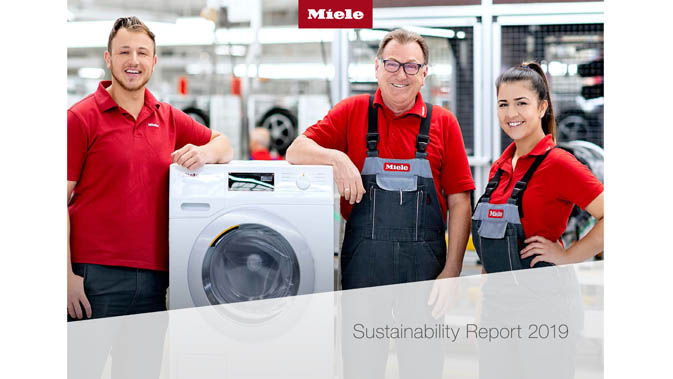
Energy efficiency and sustainability are among the key point of Miele strategy, that continues to increase efficiency across all product groups. It emerges in a concrete way in the company sustainability report, that shows that 99% of all Miele washing machines achieve the top A+++ energy efficiency rating, even overperforming by as much as 50%.
With its 2019 Sustainability Report, the Gütersloh family company provides detailed insights into its understanding of what sustainable corporate guidance is – taking on board environmental aspects along with a sense of responsibility towards employees, topics relating to the supply chain, through to involvement in society. This publication outlines 15 overarching strategic sustainability targets, from Miele’s environmental performance and stakeholder dialogue tailored to individual target audiences through to consumer-friendly digitalization. In addition to washing machines, also the other appliances created by the company are characterized by a high-level of energy efficiency. By way of an example, the new dishwashers from the G 6000 EcoFlex series surpass the required value for a top A+++ energy efficiency rating by between 10% and 20%. In late 2017, Miele received the coveted German Federal Eco Design Award for these models and their excellent energy efficiency, which is achieved through the use of an integrated heat storage system. In the commercial sector, Miele launched the Performance Plus model range during the period under review. These heavy-duty washing machines use around 20% less water and 30% less energy than their predecessors. Another very interesting proposal signed by Miele is SingleWash, an intelligent solution which shows how conflicting demands in the home can be resolved: in everyday use, washing machines are often run with only very small loads, a practice which costs unnecessary resources. With SingleWash, water consumption is precisely tailored to greatly reduced load volumes. This also automatically results in lower energy consumption.
The goal of corporate climate policy is clear: Miele supports the two-degree target of international climate politics, and aims to be carbon-neutral by 2050 at the latest. To this end, the aim is to continue to increase energy efficiency in production and reduce specific energy consumption. Miele’s 12 production plants are already pursuing their own schemes which subscribe to the overriding goals of Miele’s sustainability strategy. These also include projects to promote a circular economy. The company has therefore instigated various measures to reuse materials from old Miele machines, for example in the form of cast-iron counterweights or as granulates for plastic parts.



